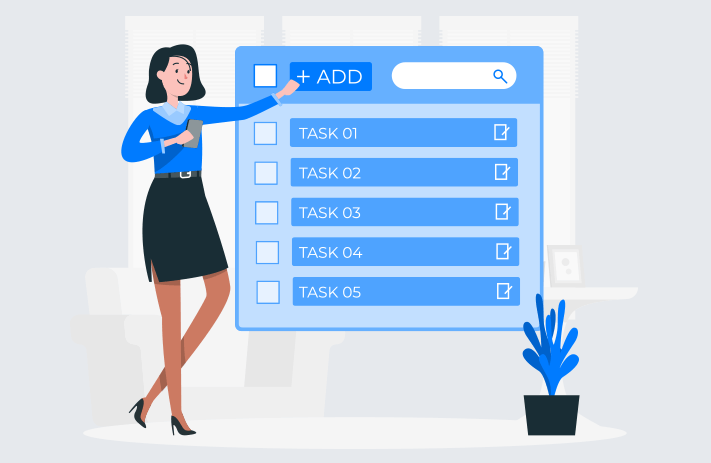
Click the button to start reading
How to Keep Track of Delegated Tasks and Manage Them the Easy Way
Delegation is important for businesses to get right. It will play an important role in the business’s day-to-day operation and is key to growth. In fact, good delegation can lead to an uptick in revenue, and who doesn’t want that.
Not all delegation is created equal. Some leaders find it hard to let go of tasks and allow their staff to take over. However, in doing so you can free yourself up to work on bigger picture stuff which might be more pressing. You may want to learn how to keep track of delegated tasks to ensure work is being completed to your standard.
There are times when delegation is an absolute necessity. If business leaders or managers decide to take some time off, whether planned absence or sickness, you need to know that the business won’t implode on itself due to your absence. Leaving your business in the hands of someone else can be stressful but if you delegate tasks well, everything should continue smoothly.

Are There Benefits to Delegation?
Delegation is a great way to bring about the next generation of leaders within your business. It gets people thinking for themselves and challenges them in personal growth. Every leader in your organization should look out for rising stars including your C-Suite execs, department heads, project managers, and team leaders.
If your company culture includes promoting from within, delegation becomes a vital tool for getting employees ready for new challenges. The delegation of tasks also helps to foster relationships between employees and their supervisors. There’s a certain degree of trust that comes with delegating tasks to employees.
Although most employees will relish the opportunity to develop their skills and take on more responsibility, others may think delegation comes from laziness. If you’re dealing with an employee who isn’t as receptive as they should be, it may be worth explaining the personal benefits. Alongside skill development, they’ll have more experience when promotions become available.
Managers delegate tasks for a variety of reasons, sometimes there are not enough hours in the week to do everything on their plates. On other occasions, it could be to train employees in new roles or to create an atmosphere of creativity and collaboration. Effective delegation is something great leaders can do very well, getting the most out of their employees to stimulate business growth and increase revenues.
As a leader, you’re responsible for the overall result. Keeping track of delegated tasks is an important aspect of the job. Entrust tasks to your staff and avoid micromanagement. However, you need to know what’s going on, if tasks are being done correctly, and if projects will be delivered on time.

Why You Need Delegation at Work
Managers who try to do everything by themselves end up burning out and providing work that doesn’t meet company expectations. It’s not uncommon to want to try and keep every plate spinning by yourself but learning to let go and delegate tasks are going to help keep you sane. It doesn’t mean you can retain ownership of the task, as you can monitor and keep track of progress.
Some members of staff incorrectly believe that the delegation of tasks is borne out of laziness and work avoidance but they fail to see the benefit this has for their own careers.
Delegation is, by design, a collaborative process and is an excellent way to facilitate a transfer of knowledge between leaders and their subordinates.
It’s an exercise in trust, if a manager asks their employees to work on important tasks, it’s a show of confidence in that individual. Developing talent in your team is a great way to retain their services, if they believe they have a future at the company it will stop them from looking for outside opportunities.
Lightening your workload means you can make progress on multiple tasks at once. You’ll be able to focus on the most pressing things while overseeing the development of delegated tasks. If you have go-getters in your team, they will relish the opportunity to take on more responsibility and demonstrate their comprehension.
You’ll still be responsible for the overall result, there’s no getting around that. So, keeping track of delegated tasks will become a key aspect of your role once tasks are handed out. Try to avoid micromanagement because this creates an uncomfortable work atmosphere which can affect employees’ moods. Once a task has been handed off, trust your employees to get the job done, but be on hand as a consultant if necessary.

Comprehensive Knowledge Base to Answer All Questions
Create a place your staff can go to seek out your wisdom without needing to knock on your door. The more information they can find without your intervention the quicker and easier they can complete tasks. You will then be able focus on your tasks safely in the knowledge that the answer to common questions can be easily found.
To do this you should host a knowledge base on your intranet which employees should be able to access with ease. Alternatively, you may wish to use a cloud service that can house all the information. Create a one-page document that’s given to all new starters that demonstrates how to access the knowledge base and how to navigate it.
You can easily upload templates, best practices, and workflows to this sort of system. Include a comprehensive FAQ section that answers questions to do with delegated tasks. This is especially important when employees are dealing with common and repetitive tasks throughout the business.
When an employee hits a roadblock they can refer to the knowledge base and find answers to help them proceed. In the event of a roadblock that doesn’t have an answer, you should address the issue with the employee and then add this to the knowledge to avoid the issue being brought up again.
The knowledge base should have walkthroughs and workflows for every common task your team undertakes. Even the simplest of tasks should have an explainer and it may be worth including a how-to video. It may seem like overload at this point, but your knowledge base should preempt everything your employees need to know to do their job.

Define the Process for Each Delegated Task
Some tasks are easy and self-explanatory. They don’t require much intervention from supervisors when handing the work off to someone else. A good example of this is when you’re transitioning to cloud-based systems and you need documents to be scanned onto the server. Asking an employee to take control of this task should be a simple show and tell and then leaving them to complete the task.
However, larger more complex tasks may require a degree of setting up and a significant transfer of knowledge. This is where the knowledge base can come in handy but it is also worth making sure the employee understands the process like the back of their hand.
If you can provide your staff with a walkthrough for how to complete complex tasks this will aid them in their understanding of the role. Think about the roadblocks you’ve encountered doing the tasks before and ask yourself what questions are they likely to ask. If you can preempt the sticking points, you can include information to keep the task progressing.
One of the best things in your arsenal is creating simple videos that show how to do the task in the right way. You can achieve this through screen recording and providing a voiceover. If the task at hand is something repetitive but time-consuming, a video to refer back to is a great asset for your team, especially if the task passes to new hands.
Creating a simple walkthrough allows you to retain control over the delegated task but allows your staff to work away without the need to seek your guidance. Of course, if members of staff have genuine questions you should be available to answer them. The goal of the walkthrough is to share knowledge and teach new skills to your employees.

What Kind of Tasks Should Be Delegated?
Now that we know how to delegate tasks in the workday, let’s take a look at the kind of tasks that can and should be delegated. Managers and supervisors need to be able to decide what tasks require their input and what tasks can be worked on by someone else.
-
Tiny and simple tasks
It might even be a task that you enjoy but if it’s holding you back from the work you really need to be doing, it might be worth handing it off to someone else. Things like copy & paste responses to emails, or scheduling the meeting room for next week. It may take only a few minutes, but those minutes can quickly escalate to hours.
-
Learning opportunities
Delegating jobs that can improve someone’s skills, experience or understanding is the best kind of task to pass to an employee. Upskilling the people on your team benefits them, the business, and yourself. It’s a rare opportunity where everyone wins.
-
Tasks you absolute hate
You worked hard to get to where you are and one of the benefits of being in charge is getting someone else to do the jobs you hate. They may not necessarily be awful tasks, but just something that you, personally, would rather not do. Luckily, you can delegate these tasks to your employees, you may even find that someone has an affinity for the task.
-
Routine and repetitive tasks
Tasks that are a consistent presence in your life, but require little managerial input. These sorts of tasks have a pattern that needs to be learned and followed to be completed. Teach your employees how to do this and you’ll be able to share the burden around the team.
-
Tasks that take a long time
Sometimes you just have more pressing things to work on and some tasks just take too long. You need to stay productive and you can’t do that if you’re stuck with a time-consuming menial task that needs to be done but doesn’t necessarily need to be done by management. Ask one of your employees to take over this task if it isn’t impeding on their important work.

How to Keep Track of Delegated Tasks
Just because you’ve handed the job off to someone else, doesn’t mean you aren’t responsible for it. Learning how to delegate tasks is the first step, but monitoring their progress is important to make sure your expectations are being met by your employees. Here are the 4 steps you should take when assigning the task to someone new:
- Define the deliverables. Tell the person taking on the task exactly what you expect them to do. This helps them (and you) understand when the tasks have been completed and can be signed off on.
- Be available for questions. The knowledge base should be an employee’s first point of call, but if there is information missing, you need to be available to answer any questions. There are no stupid questions if someone is trying to deliver results for you.
- Make clear deadlines. If you’ve been working on the task before, you’ll know how long it should take. Set expectations for the delivery and make them clear to your employee.
- Keep track of delegated tasks. You can’t assume that everyone has a good task management system. Everyone works in different ways, but as the boss, you need to be more organized. Below are some suggestions for keeping track.
Sticky notes
Nice and simple, utilize sticky notes to detail who is working on what task and when you need it to be completed. This is a really simple solution but it’s been working for years. A low-tech option like this is perfect for managers who aren’t tech-savvy and the idea of automation might sound otherworldly.
Automate with email
If you work in an office then you probably already use email to delegate tasks, or you’ll use an instant messenger and formalize via email. The next step in this process is to set up automation through email to keep track of delegated tasks. Use your built-in to-do list to assign work to your employees.
Kanban boards with Teamly
Kanban boards are a visual project management tool used to monitor the progress of tasks. In their most simple form you’ll have three columns named “to-do,” “doing,” and “done.” You can insert each task into the to-do folder and assign jobs to specific employees, they can then move the task along with the board as they progress.
Teamly has kanban boards built into it and you can use them to manage your team. It’s a one-stop shop for project management and will be your secret weapon to keeping track of delegated tasks.
Conclusion
The delegation of tasks has plenty of benefits and is something that managers should embrace. Hoarding tasks is only going to slow you down and ultimately hold your business back from growing. Share tasks with your staff to enable them to develop their professional career. Use this as an opportunity to teach and build trust between managers and their staff.
















